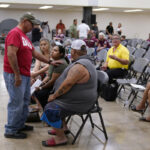
Russian President Vladimir Putin’s barbaric, indiscriminate bombing of apartment buildings, schools and other civilian targets in Ukraine hasn’t waned. In Kharkiv, the country’s second largest city, recent Russian missile strikes have hit a school, a shopping center and apartment buildings. Elsewhere in eastern Ukraine, Russian fighter jets have been dropping cluster bombs on villages, raining shrapnel onto wooden cottages and killing anyone unfortunate enough to be outside at the wrong moment.
These latest reports of civilian carnage, however, haven’t drawn the same degree of disgust and indignation from America and its European allies that was seen in the early weeks of the war. Why?
It appears as if Ukraine war fatigue is seeping into the collective consciousness of the West.
Nearly five months after Putin’s audacious, unprovoked invasion of Ukraine, the conflict increasingly looks like a grinding, bloody stasis that could endure for many more months, if not years. The Kremlin has refocused its troops and resources on the Donbas region in eastern Ukraine, after grossly miscalculating that it could roll through the capital, Kyiv, with relative ease. Ukrainian President Volodymyr Zelenskyy’s forces defied skeptics and held off Putin’s initial attempt to blitzkrieg his way across the country, but, at the current level of support, they can’t match the firepower that the Russians have in the Donbas.
For Ukraine, the war is existential. Putin has made it clear he believes Ukraine has no right to its own sovereignty and belongs firmly under the shadow of Kremlin rule. For his part, the Russian leader can’t reverse course now. He has wholly committed himself to a despotic, high-stakes gambit that risks lasting harm to his country’s economy and to the beleaguered Russian people.
So far Ukraine has been buoyed by the steadfast unity that America and its allies in Europe have mustered against Putin’s belligerence. Western leaders have just added bans on the import of Russian gold to a long list of sanctions that hamstring Russia’s energy sector and financial institutions, and take aim at Putin’s oligarch allies. The U.S. and other NATO nations have also tried to keep Ukraine’s military well-supplied — recent shipments of U.S.-built, multiple-rocket launchers known as HIMARS (High Mobility Artillery Rocket System) have proved to be particularly effective against Russian military targets.
Lately, though, murmurs of “Ukraine fatigue” have been coursing through Europe.
Nathalie Tocci, director of Italy’s Institute of International Affairs, recently told Los Angeles Times columnist Doyle McManus that in Europe, Ukraine fatigue “is here already. The pain (from sanctions) is far higher in Russia than in the West, of course, but our tolerance of pain is lower. So the question is which curve is steeper — Russia’s ability to wage war or our ability to endure economic pain.”
French President Emmanuel Macron certainly raised concerns about a crack in Western unity when he said in June that the West should take care to avoid trying to “humiliate” Russia. Macron and other European leaders may be getting nervous about this fall, when their countries’ dependence on Russian natural gas for heating becomes painfully vulnerable to Putin’s hand on the shut-off valve.
Even in the U.S., Ukraine fatigue may be setting in. An Associated Press poll in May found that the majority of Americans prioritized limiting damage to the U.S. economy over imposing effective sanctions against Russia. That was in May. With inflation now reaching a four-decade high of 9.1%, the share of Americans disengaging from the crisis in Ukraine is likely to grow.
That would prove costly for America and the rest of the world, particularly in the long run. A victory for Putin in Ukraine would embolden the Russian leader to set his sights farther westward, onto eastern European nations within the NATO fold, such as Poland, Romania and the Baltic states. Putin has repeatedly demonstrated a resolve to capitalize on Western disunity. He not only thrives on dissent within Western nations, he desperately needs it.
Putin is banking on Western nations to grow weary of the conflict in Ukraine and disengage. He has no qualms about sacrificing thousands of lives of Russian soldiers, or about allowing sanctions to ratchet up the hurt on the lives and livelihoods of millions of Russians. He is fully prepared to outlast the West.
And if the U.S. and its European allies allow their resolve to ebb, he will.
Join the discussion on Twitter @chitribopinions and on Facebook .
Submit a letter, of no more than 400 words, to the editor here or email letters@chicagotribune.com .




